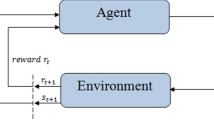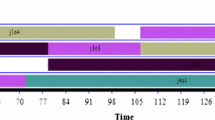Abstract
The hybrid flow shop scheduling problem with unrelated parallel machine is a typical NP-hard combinatorial optimization problem, and it exists widely in chemical, manufacturing and pharmaceutical industry. In this work, a novel mathematic model for the hybrid flow shop scheduling problem with unrelated parallel machine (HFSPUPM) was proposed. Additionally, an effective hybrid estimation of distribution algorithm was proposed to solve the HFSPUPM, taking advantage of the features in the mathematic model. In the optimization algorithm, a new individual representation method was adopted. The (EDA) structure was used for global search while the teaching learning based optimization (TLBO) strategy was used for local search. Based on the structure of the HFSPUPM, this work presents a series of discrete operations. Simulation results show the effectiveness of the proposed hybrid algorithm compared with other algorithms.
Similar content being viewed by others
References
GUPTA J N D. Two-stage hybrid flowshop scheduling problem [J]. Journal of the Operational Research Society, 1998, 39: 359–364.
MARQUEZ A C, GUPTA J N D, IGNIZIO J P. Improving preventive maintenance scheduling in semiconductor fabrication facilities [J]. Production Planning & Control: The Management of Operations, 2006, 17(7): 742–754.
LIN H T, LIAO C J. A case study in a two-stage hybrid flow shop with setup time and dedicated machines [J]. International Journal of Production Economics, 2003, 86(2): 133–143.
FANJUL-PEYRO L, RUIZ R. Iterated greedy local search methods for unrelated parallel machine scheduling [J]. European Journal of Operational Research, 2010, 207(1): 55–69.
CHAUDHRY I A, MAHMOOD S, SHAMI M. Simultaneous scheduling of machines and automated guided vehicles in flexible manufacturing systems using genetic algorithms [J]. Journal of Central South University, 2011, 18(5): 1473–1486.
WANG L, WANG S Y, XU Y, ZHOU G, LIU M. A bi-population based estimation of distribution algorithm for the flexible job-shop scheduling problem [J]. Computers & Industrial Engineering, 2012, 62(4): 917–926.
LI J Q, PAN Q K, WANG F T. A hybrid variable neighborhood search for solving the hybrid flow shop scheduling problem [J]. Applied Soft Computing, 2014, 24(11): 63–77.
PAN Q K, WANG L, LI J Q. A novel discrete artificial bee colony algorithm for the hybrid flowshop scheduling problem with makespan minimization [J]. Omega, 2014, 45(6): 42–56.
SATAPATHY S C, NAIK A. Cooperative teaching–learning based optimisation for global function optimization [J]. International Journal of Applied Research on Information Technology and Computing, 2013, 4(1): 1–17.
RAO R V, WAGHMARE G G. A comparative study of a teaching–learning-based optimization algorithm on multi-objective unconstrained and constrained functions [J]. Journal of King Saud University-Computer and Information Sciences, 2014, 26(3): 332–346.
XU Y, WANG L, WANG S Y, LIU M. An effective teaching-learning-based optimization algorithm for the flexible job-shop scheduling problem with fuzzy processing time [J]. Neurocomputing, 2015, 148(1): 260–268.
JUN S B, PARK J W. A hybrid genetic algorithm for the hybrid flow shop scheduling problem with nighttime work and simultaneous work constraints: A case study from the transformer industry [J]. Expert Systems with Applications, 2015, 42(15, 16): 6196–6204.
PAN Q K, WANG L, MAO K, ZHAO J H, ZHANG M. An effective artificial bee colony algorithm for a real-world hybrid flowshop problem in steelmaking process [J]. IEEE Transactions on Automation Science and Engineering, 2013, 10(2): 307–322.
RAO R V, SAVSANI V J, VAKHARIA D P. Teaching–learning-based optimization: a novel method for constrained mechanical design optimization problems [J]. Computer Aided Design, 2011, 43(3): 303–315.
BAYKASOĞLU A, HAMZADAYI A, KÖSE S Y. Testing the performance of teaching–learning based optimization (TLBO) algorithm on combinatorial problems: Flow shop and job shop scheduling cases [J]. Information Sciences, 2014, 276(8): 204–218.
BANERJEE S, MAITY D, CHANDA C K. Teaching learning based optimization for economic load dispatch problem considering valve point loading effect [J]. International Journal of Electrical Power and Energy Systems, 2015, 73(12): 456–464.
MUHLENBEIN H, PAASS G. From recombination of genes to the estimation of distributions I: Binary parameters [J]. Lecture Notes in Computer Science, 1996, 1141(1): 178–187.
WAN Z P, MAO L J, WANG G M. Estimation of distribution algorithm for a class of non-linear bilevel programming problems[J]. Information Sciences, 2014, 256(20): 184–196.
LIAO C J, TJANDRADJAJA E, CHUNG T P. An approach using particle swarm optimization and bottleneck heuristic to solve hybrid flow shop scheduling problem [J]. Applied Soft Computing, 2012, 12(6): 1755–1764.
KAHRAMAN C, ENGIN O, KAYA I, YILMAZ M K. An application of effective genetic algorithms for solving hybrid flow shop scheduling problems [J]. International Journal of Computational Intelligence Systems, 2008, 1(2): 134–147.
ALAYKÝRAN K, ENGIN O, DÖYEN A. Using ant colony optimization to solve hybrid flow shop scheduling problems [J]. International Journal of Advanced Manufacturing Technology, 2007, 35(5, 6): 541–550.
NIKNAM T, AZIZIPANAH-ABARGHOOEE R, RASOULNARIMANI M. A new multi objective optimization approach based on TLBO for location of automatic voltage regulators in distribution systems [J]. Engineering Applications of Artificial Intelligence, 2012, 25(8): 1577–1588.
Author information
Authors and Affiliations
Corresponding author
Additional information
Foundation item: Projects(61573144, 61773165, 61673175, 61174040) supported by the National Natural Science Foundation of China; Project(222201717006) supported by the Fundamental Research Funds for the Central Universities, China
Rights and permissions
About this article
Cite this article
Sun, Zw., Gu, Xs. A novel hybrid estimation of distribution algorithm for solving hybrid flowshop scheduling problem with unrelated parallel machine. J. Cent. South Univ. 24, 1779–1788 (2017). https://doi.org/10.1007/s11771-017-3586-6
Received:
Accepted:
Published:
Issue Date:
DOI: https://doi.org/10.1007/s11771-017-3586-6




